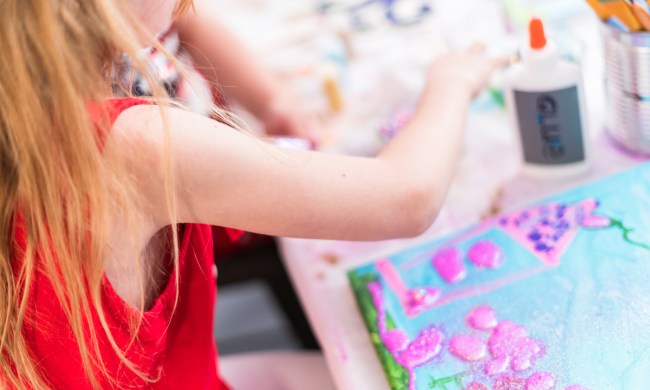There are a few habits that you hope your child never picks up. One you pray your child never starts doing is spitting. While not only gross, it can also get your child into major trouble if done somewhere like school or daycare.
Now, not every child who spits is doing it to be mean or insulting. But even if your child is doing it out of sheer boredom, you will need to address it immediately. While negative habits aren’t the most fun to discuss with your child, we can help you get your kid’s spitting behavior under control.

Why is my kid spitting?
Not everything your child does is to spite you. When it comes to spitting, your kiddo could be doing it for several reasons, and not all of them are bad.
Anger or frustration
Depending on the age of your child, she may not be able to verbalize how she feels. Spitting is the way to show you she’s upset.
Seeking attention
Your child could feel ignored and one way to get attention is to act out. Spitting is a straightforward way to get noticed immediately.
Showing off
The joys of peer pressure, right? Your child could be spitting because other kids are telling him to and he’s just going along with it.
Defending themselves
This one might seem a little backward, but hear us out. If a child doesn’t know how to defend herself and another kid is trying to take her toy, she might feel like spitting will get the kid to go away.
Anxiety or OCD
When your child is in a situation that makes him anxious, he may develop a nervous tick to calm himself down. Some kids turn to compulsive spitting to feel more in control of their surroundings.

What type of behavior is spitting?
Spitting can be a different kind of behavior depending on why a child is doing it.
Disruptive behavior
Spitting on its own without any other factors could be a disruptive behavior.
Sensory behavior
If your child is bored, spitting could be the way she copes with that. Your child needs something else to do with her mouth to keep busy.
Aggressive behavior
When your child becomes angry or frustrated, he may spit if he doesn’t know another way to process those feelings. The only way you’re going to figure out how to get your child to stop spitting is to figure out the reasoning behind doing it.
Is spitting a symptom of autism?
- It’s not a sign on its own.
- It could be — coupled with other symptoms.
Spitting alone isn’t a reason to think your child is autistic. If this is the sole cause of concern, you shouldn’t jump to that conclusion. Some kids just spit. You have to look at your child as a whole.
While most children who are autistic do tend to drool and spit, that one sign doesn’t automatically point to that. Now, if you notice developmental and social delays, failure to make eye contact, and spitting, then that would be a reason to talk to your child’s pediatrician about having an autistic consultation done.

How to help your child to stop spitting
Now you know the reasons behind your child’s spitting issue, how are you going to stop it? Your initial reaction may be to yell at the child to stop spitting. But we know from experience that will only make the child want to spit more.
Dos
Remain calm
Shouting or yelling automatically shuts a person down (no matter what age). It doesn’t teach your child how to safely show emotions.
Have your kid clean it up
Don’t let anyone clean up her spit but her, and she’ll be less likely to want to continue to spit everywhere.
Remind him what spit is for
You can tell your child that spit belongs in your mouth, it’s gross when you spit outside your mouth, and that’s it. No long speeches are needed.
Redirect to alternatives
The best way we found to curb a spitting child is to give her another sensory outlet. Depending on your kid’s age, you can give her a hard candy to suck on or gum to chew.
Provide more oral stimulation during the day
Another amazing way to keep the kids from spitting is to find subtle ways to constantly keep their little lips from even having time to spit. When possible, play games or do other activities that require your child to use his face.
Put the praise on them
Tell your children they should be so proud of themselves for getting their spitting under control. They need to feel good about the fact that they stopped this behavior, even if you helped.
As with any negative behavior you want your child to stop, it’s going to be a process. Your kid isn’t going to quit overnight, even if it seems like that’s how fast they started showing the behavior.
Parenting means being able to face the bad with as much grace as the good. Kids are going to test you on purpose and just by chance. Parenting a kid who spits is just one challenge you might have to work through. But if you do need to get a spitting child’s behavior under control, we hope we help to get you there.



